|
|
|
Sort Order |
|
|
|
Items / Page
|
|
|
|
|
|
|
| Srl | Item |
| 1 |
ID:
111183
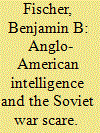

|
|
|
|
|
| Publication |
2012.
|
| Summary/Abstract |
During the Soviet war scare of the 1980s, British intelligence shared vital information from KGB officer Oleg Gordievsky with its American partners. The US intelligence community, however, was suspicious of the message and the messenger, dismissing Soviet 'war talk' as disinformation. Some officials even believed that the British had tweaked their reports to influence US policy. President Ronald Reagan, however, on the advice of Prime Minister Margaret Thatcher, listened to Gordievsky rather than his intelligence advisors. The war scare had a profound influence on Reagan's thinking about nuclear war, Kremlin fears, and Soviet-American relations that led him to seek a new détente with Moscow and the end of the Cold War through diplomacy rather than confrontation. Subsequent events and post-Cold War revelations vindicated Gordievsky. Reagan sought his advice on the eve of his first summit meeting with Mikhail Gorbachev and later expressed his gratitude during a private meeting in the Oval Office.
|
|
|
|
|
|
|
|
|
|
|
|
|
|
|
|
| 2 |
ID:
111182
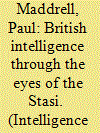

|
|
|
|
|
| Publication |
2012.
|
| Summary/Abstract |
The German parliament's Law on the Stasi Records, passed in 1991, extended the principle of freedom of information to the records of a Communist security service. By so doing, it has given historians, former targets of Stasi intelligence collection and others an unprecedented insight into the operations of such a service. Enough records of the Stasi's trials department have been made available to reconstruct a picture of the work of British intelligence agencies in the years 1945-61, and above all the work of the Secret Intelligence Service (SIS). They show that SIS was a very skilful service which obtained the high-grade intelligence it sought. However, SIS's work in East Germany was undone in the late 1950s by the treason of the KGB's penetration agent in it, George Blake.
|
|
|
|
|
|
|
|
|
|
|
|
|
|
|
|
| 3 |
ID:
111180
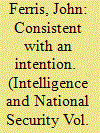

|
|
|
|
|
| Publication |
2012.
|
| Summary/Abstract |
From 1934, Britain expanded its military and naval intelligence agencies against Japan. At the outbreak of war in Europe, they, and most of their personnel, were moved from Hong Kong to Singapore, and joined into an interservice organization, the Far East Combined Bureau. Much of the evidence about the Far East Combined Bureau is lost, but the surviving record illustrates what intelligence was available to decision-makers in Singapore during 1940-41, thus illuminating every debate about this disaster. Even more: it enables a reconceptualization of the relationship between intelligence and the outbreak of the Pacific War as a whole.
|
|
|
|
|
|
|
|
|
|
|
|
|
|
|
|
| 4 |
ID:
111179
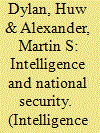

|
|
|
| 5 |
ID:
111187


|
|
|
| 6 |
ID:
111181
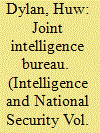

|
|
|
|
|
| Publication |
2012.
|
| Summary/Abstract |
In 1946 veteran British intelligence officer Kenneth Strong undertook the Directorship of a new intelligence organization, the Joint Intelligence Bureau (JIB). The JIB absorbed the responsibilities of several wartime intelligence organs, and was responsible for economic, topographic, and aspects of scientific intelligence on an inter-service basis. Its responsibilities grew over the following 18 years; most notably, it absorbed atomic intelligence in 1957. When the Defence Intelligence Staff was created in 1964, absorbing the JIB and the individual Service agencies, JIB was at its heart and Kenneth Strong its first Director. The organization conducted key work in the early Cold War, was at the centre of an international network of Joint Intelligence Bureaux, and was an important stepping stone in the movement to centralize military and military-relevant intelligence in Britain - but the historiography pays it surprisingly little attention. This paper introduces the JIB and various aspects of its work, and demonstrates that its low profile in the historiography is unjustified.
|
|
|
|
|
|
|
|
|
|
|
|
|
|
|
|
| 7 |
ID:
111185


|
|
|
|
|
| Publication |
2012.
|
| Summary/Abstract |
A growing interest in the history of intelligence might be a way to learn more about not only the past, but also the dynamics shaping the future of intelligence. Intelligence is an evolving activity and the twentieth-century experience must be regarded as a phase in an ongoing transformation of its institutions, methods and roles. At least six fundamental processes can be identified as relevant to this re-shaping of intelligence in long perspective; the decreasing hegemony of national intelligence, the rise of new fields of knowledge with intelligence relevance, the diminishing relative importance of exclusive sources and methods, the rise of new actors producing and providing intelligence, the loss of an intellectual monopoly in a competitive knowledge environment and finally an increasing demand for reliable assessments and verification in a fragmented world of information.
|
|
|
|
|
|
|
|
|
|
|
|
|
|
|
|
| 8 |
ID:
111186
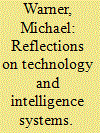

|
|
|
|
|
| Publication |
2012.
|
| Summary/Abstract |
The impact of individual technological innovations on intelligence operations is often discussed, but the influence of technological change per se on intelligence systems remains less well understood. The historical literature on this topic is uneven - filled with detailed narratives on certain aspects, but also with surprisingly little attention to larger trends and their meaning. This is significant for two reasons. First, it means we have an incomplete understanding of what happened in the past, particularly for the 'analog revolution' in intelligence in the twentieth century. Second, it leaves us with few clues for understanding another wave of technological change washing over the intelligence profession at this time (a 'digital revolution'). Looking at the second revolution in the light of the first can give us important clues to what to watch for in coming years.
|
|
|
|
|
|
|
|
|
|
|
|
|
|
|
|
| 9 |
ID:
111184
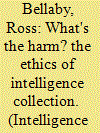

|
|
|
|
|
| Publication |
2012.
|
| Summary/Abstract |
As the professional practice of intelligence collection adapts to the changing environment and new threats of the twenty-first century, many academic experts and intelligence professionals call for a coherent ethical framework that outlines exactly when, by what means and to what ends intelligence is justified. Reports of abuse at detention centres such as Guantanamo Bay and Abu Ghraib, the ever increasing use of technological surveillance, and the increased attention on the use of torture for intelligence collection purposes have all highlighted a need to make an explicit statement about what is and what is not permissible intelligence practice. In this article an ethical framework will be established which will outline under what circumstances the use of different intelligence collection activities would be permissible. This ethical framework will first underline what it is about intelligence collection that is 'harmful' and, therefore, should be prohibited under normal circumstances. The ethical framework then outlines a set of 'just intelligence principles', based on the just war tradition, which delineate when the harm caused can be justified. As a result, this article outlines a systemic ethical framework that makes it possible to understand when intelligence collection is prohibited and when it is permissible.
|
|
|
|
|
|
|
|
|
|
|
|
|
|
|
|
|
|
|
|
|